Iranian officials as of Monday have provided no evidence nor confirmed remarks by top prosecutor Mohammad Jafar Montazeri this weekend claiming that the country’s Islamist “morality police” had been “abolished.”
The “morality police,” formally the “Gasht-e-Ershad” or “guidance patrols,” are a notoriously repressive wing of law enforcement in Islamist Iran that enforce the regime’s extremist interpretation of sharia, or the Islamic law. The regime established the “guidance patrols” in 2006, making them a fairly new addition to the Islamic Republic’s police apparatus. The agency’s mandate most commonly manifests as “morality police” agents abusing women accused of showing too much of their hair, wearing tight clothing, or otherwise running afoul of “morality” edicts. Iran mandates all women wear hijab, or headscarves, and loose clothing, but the law does not specify how much hair a woman should cover or how tight clothes must be to violate the law.
The Quran also mandates that men dress modestly, but the “morality police” rarely, if ever, harass men for immodest clothing.
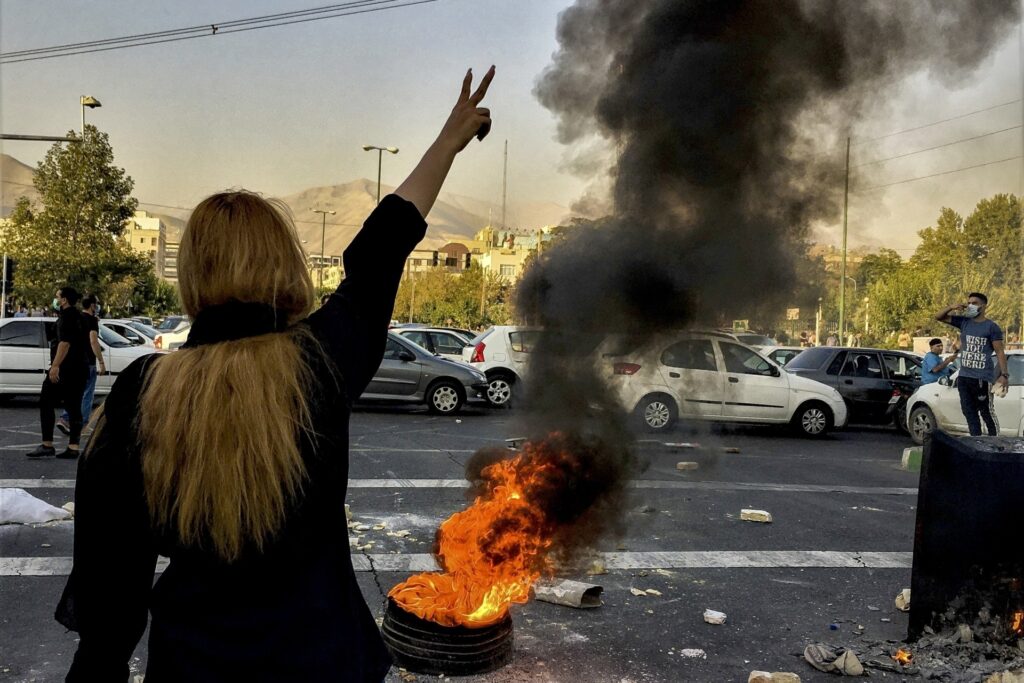
In this photo taken by an individual not employed by the Associated Press and obtained by the AP outside Iran, Iranians protests the death of 22-year-old Mahsa Amini after she was detained by the morality police, in Tehran, October 1, 2022. (AP Photo/Middle East Images)
The agency is currently at the center of a controversy that has fueled deadly protests nationwide since September, when the “morality police” beat 22-year-old Mahsa Amini to death for allegedly wearing her hijab inappropriately. The young woman’s death prompted a wave of protests led by women calling for an end, initially, to the “morality police” and misogynistic laws, and ultimately fueled protests urging an end to the Islamic regime generally.
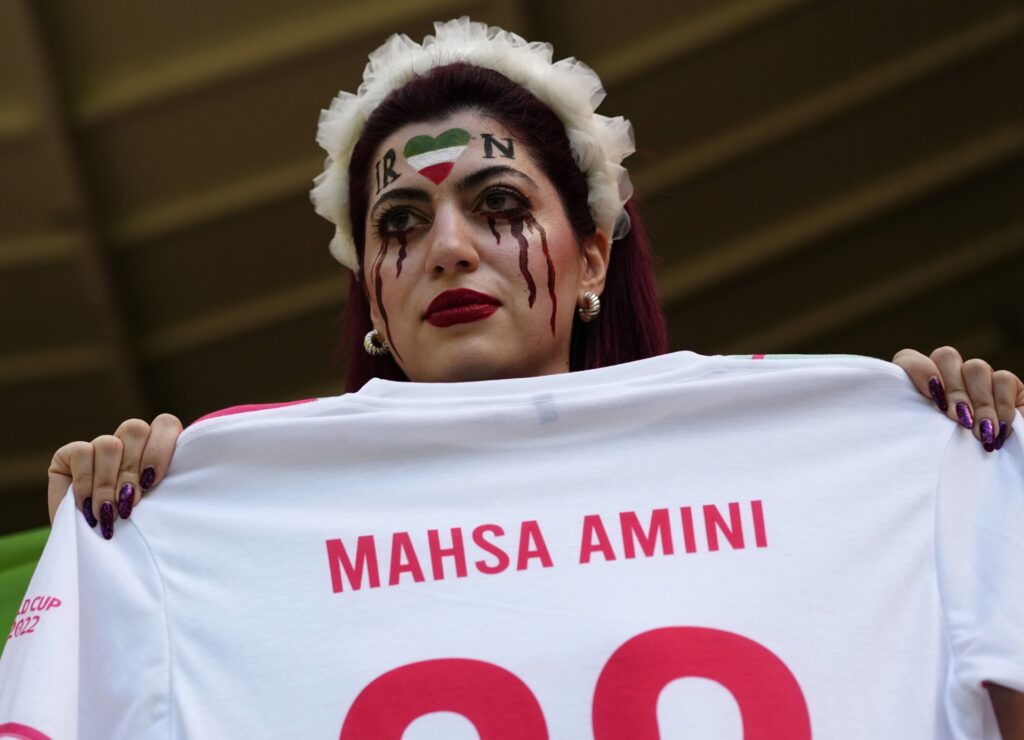
A woman holds a jersey with the name of Mahsa Amini, a woman who died while in police custody in Iran at the age of 22, as she takes her place in the stands ahead of the World Cup group B soccer match between Wales and Iran, at the Ahmad Bin Ali Stadium in Al Rayyan, Qatar, Friday, November 25, 2022. (AP Photo/Pavel Golovkin)
Iranian officials insist that Amini died of an alleged health issue, not as a result of police brutality, and claims the protests are foreign infiltration operations meant to weaken the regime from the inside. Last week, Iranian President Ibrahim Raisi visited Amini’s home province of Kurdistan in response to the particularly severe unrest in that region, preaching unity and claiming protesters were engaging in “chaos, insecurity, and terrorist acts.”
Raisi’s comments appeared in stark contrast to Attorney General Mohammad Jafar Montazeri’s as quoted in the Iranian ISNA news agency appearing to indicate the regime was open to addressing the protesters’ concerns.
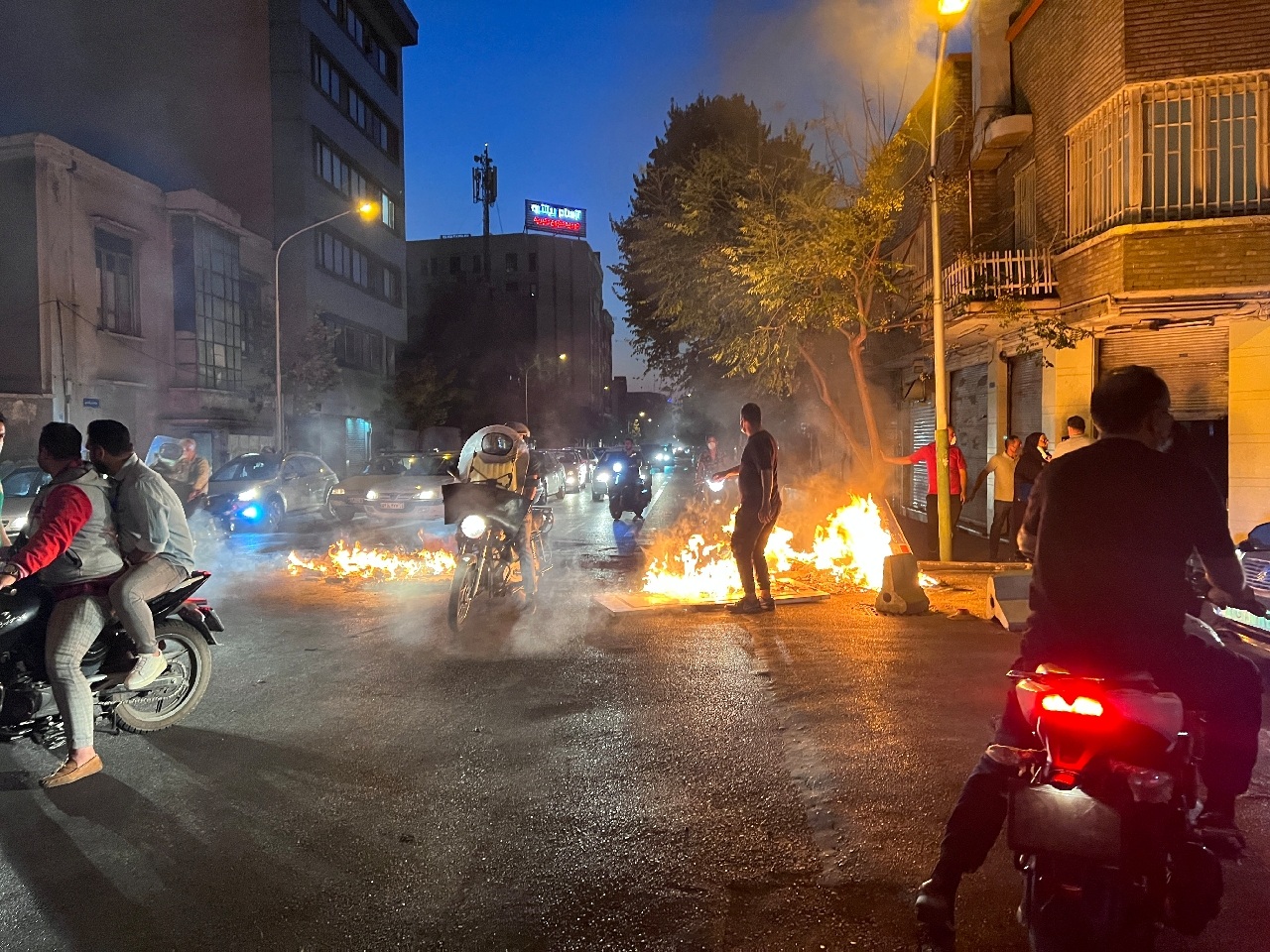
A picture obtained by AFP outside Iran reportedly shows objects set ablaze in the capital Tehran on October 8. (AFP)
“The morality police has nothing to do with the judiciary, and it was abolished by those who created it,” ISNA quoted Montazeri as saying on Saturday during remarks to the press at a conference, a day after he reportedly claimed the Iranian regime was reconsidering the country’s hijab laws and that such reconsideration would result in a public comment in a week or two. Montazeri’s comments were particularly bizarre as the morality police operate under a committee directly under Raisi’s control and Raisi had made public appearances the day before without announcing such a monumental change.
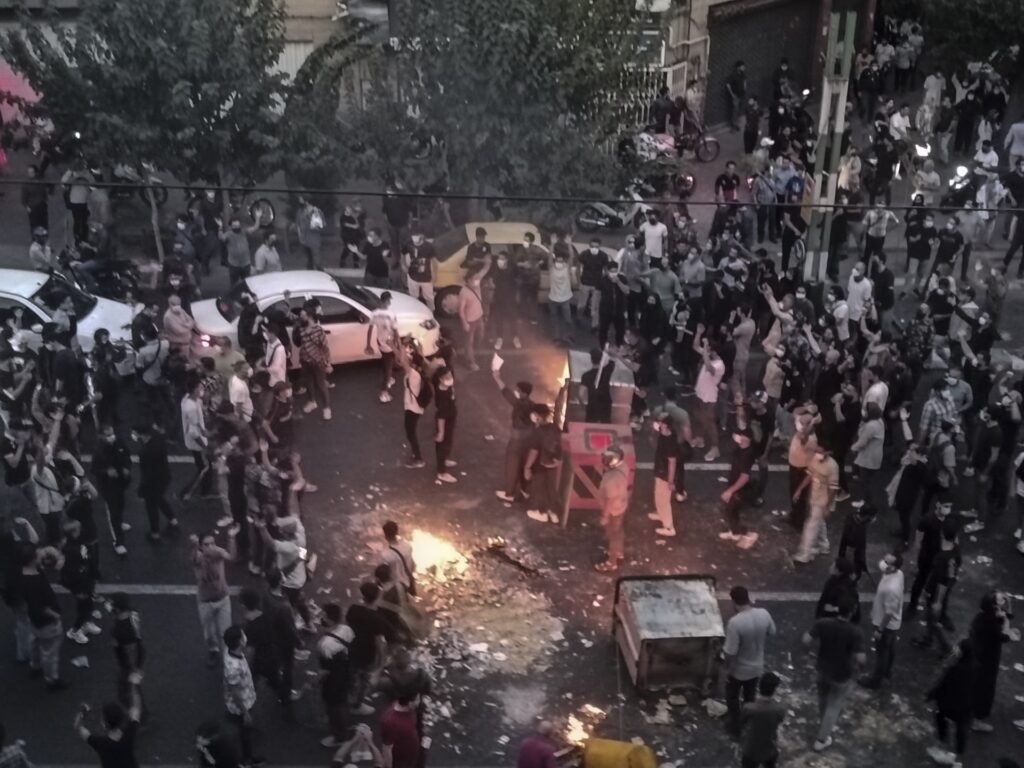
Iranians protest a 22-year-old woman Mahsa Amini’s death after she was detained by the morality police, in Tehran, Sept. 20, 2022, in this photo taken by an individual not employed by the Associated Press and obtained by the AP outside Iran. (AP Photo/Middle East Images)
On Monday, the independent outlet Iran International reported that eyewitnesses within Iran had no reason to believe that the morality police were no longer operational, citing an incident in Tehran in which “judicial authorities” closed a children’s amusement center allegedly because women working at the facility had improperly shown their hair in public.
“Judicial authorities have also been summoning celebrities such as actress Shaghayegh Dehghan who published a photo of herself without the compulsory veil on a Tehran street,” Iran International reported.
Adding to evidence that Montazeri’s claim was not true, Iran International quoted the Iranian newspaper Shargh attempting to contact law enforcement officials to clarify if the “morality police” still existed, receiving no clear answer.
“It’s not time for us to discuss this. The Police will comment whenever it deems is necessary. Don’t tell [anyone] you have contacted us,” a public relations official, Colonel Ali Sabahi, reported responded to the newspaper. “I’m not the attorney general, go ask him!”
The U.S.-based Radio Free Europe/Radio Liberty (RFE/RL) similarly documented the silence from other Iranian regime officials, particularly those with actual authority over the “morality police,” regarding the attorney general’s comments.
“As of December 5, there had been no word from officials — including the Interior Ministry — on the status of the controversial morality police,” the outlet noted.
Iranian state and pro-regime media outlets did not soften their tone against the protests on Monday, nor did they indicate the regime was preparing any concessions. Citing the nation’s foreign minister, the Tasnim News Agency relayed the regime’s claims yet again that the protests are a foreign intelligence operation meant to erode trust in the government. Foreign Minister Hossein Amirabdollahian, at a press conference in Serbia, claimed that the protests were created by the government of the United States in an attempt to force Iran to negotiate another nuclear deal, according to Tasnim.
“Amirabdollahian said the Iranian nation has successfully emerged from the recent riots that were provoked by foreign interference with hybrid warfare,” Tasnim reported, later quoting him as saying, “We hear and respond to the peaceful demands of the noble Iranian people on various issues but we do not allow anyone to (incite) riots and (carry out) acts of terror in our country.”
Similarly, on Saturday, the state outlet PressTV quoted a statement from Iran’s Interior Ministry describing the protests as a “hybrid war against the Islamic Republic” by unspecified actors intending to allow “separatist and terrorist groups to infiltrate into the country and carry out brutal attacks against innocent people.”
The Iranian regime has not presented any evidence, nor have any independent parties, indicating that the Mahsa Amini protests are not organic manifestations of dissent by Iranian nationals, nor has any evidence at press time indicated that the American government is involved with the protests in any way.
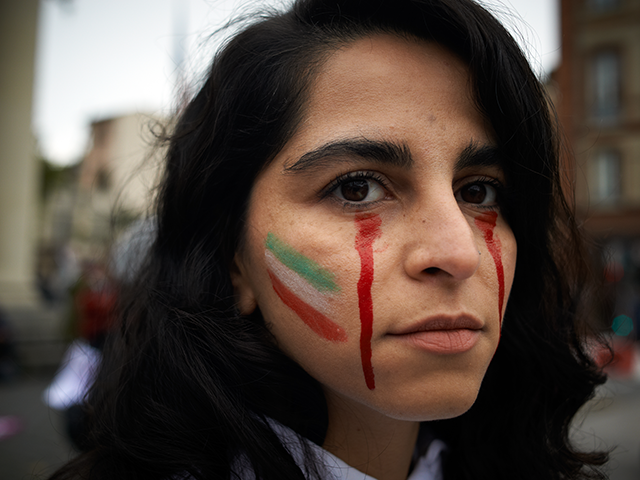
COMMENTS
Please let us know if you're having issues with commenting.